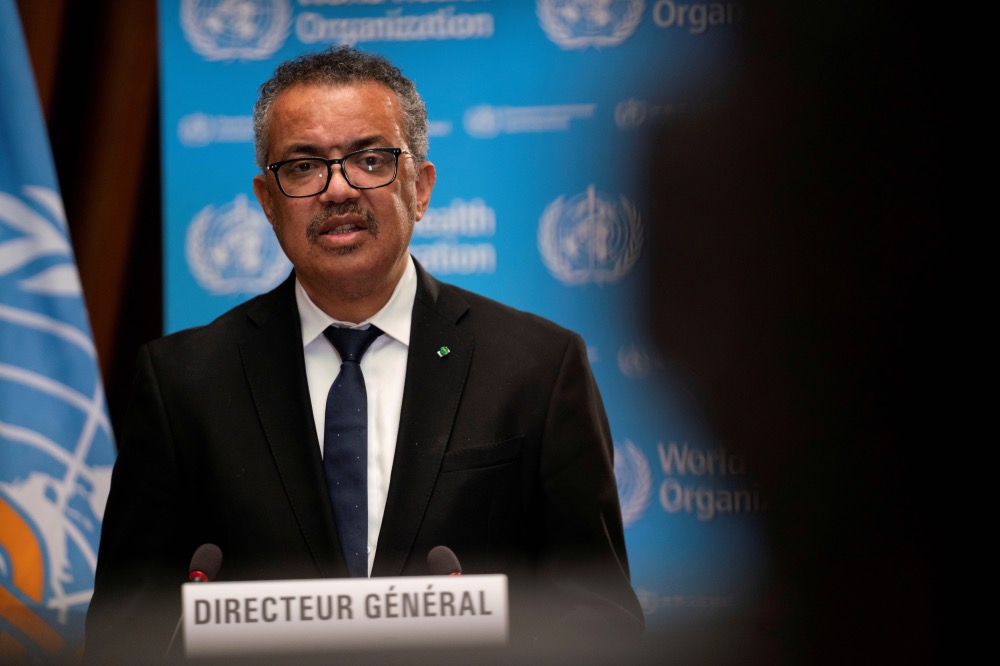Geneva/Zurich, Switzerland
Reuters
More producers of COVID-19 vaccines should follow AstraZeneca’s lead and license technology to other manufacturers, the World Health Organization’s head said on Monday, as he described continuing vaccine inequity as “grotesque”.

Tedros Adhanom Ghebreyesus, director general of the World Health Organization speaks during the opening of the 148th session of the executive board on the coronavirus disease outbreak in Geneva, Switzerland, on 18th January. PICTURE: Christopher Black/WHO/Handout/File photo.
ASTRAZENECA TO PUBLISH FULL US TRIAL RESULTS
AstraZeneca will publish up-to-date results from its major US COVID-19 vaccine trial within 48 hours after health officials publicly criticised the drugmaker for using “outdated information” to show how well the immunization worked.
The rare public rebuke marks the latest setback for the vaccine once hailed as a milestone in the fight against the COVID-19 pandemic but has since been dogged by questions over its effectiveness and possible side effects.
AstraZeneca said results it published on Monday in which the vaccine had demonstrated 79 per cent efficacy were based on an interim analysis of data through 17th February, and it would now “immediately engage” with the independent panel monitoring the trial to share its full analysis.
The British-based drugmaker on Tuesday said it had reviewed the preliminary assessment of its full, or primary, analysis and found it to be consistent with the interim report.
But the Washington Post reported that the data monitoring panel told federal officials they had been working with the company through March, had seen data that showed the vaccine might be 69 per cent to 74 per cent effective, and had “strongly recommended” AstraZeneca include that information in its public statement.
AstraZeneca shares fell 1.8 per cent in London trading.
The US National Institute for Allergy and Infectious Diseases said on Monday that the board charged with ensuring the trial’s safety and accuracy had expressed concern the company may have included outdated data that gave an incomplete view of the shot’s effectiveness.
NIAID Director Dr Anthony Fauci called the whole issue a really unfortunate unforced error.
“This is very likely a very good vaccine and this kind of thing does…nothing but really cast some doubt about the vaccines and may contribute to the hesitancy,” he told ABC’s Good Morning America.
“The data really are quite good but when they put it into the press release it wasn’t completely accurate,” he said.
In addition to the 79 per cent efficacy in stopping symptomatic illness in the trial conducted in the United States, Chile and Peru, the data reported on Monday also showed the shot was 100 per cent effective against severe or critical forms of the disease and posed no increased risk of blood clots.
– KATE KELLAND and JULIE STEENHUYSEN, Reuters
AstraZeneca’s shot, which new US data on Monday showed was safe and effective despite some countries suspending inoculations over health concerns, is being produced in various locations including South Korea’s SKBioScience and the Serum Institute of India.
WHO Director-General Tedros Adhanom Ghebreyesus called for more manufacturers to adopt this model to boost supplies, including for the COVAX vaccine sharing program seeking to speed more shots to developing countries.
“The gap between number of vaccines administered in rich countries and the number administered through COVAX is growing and becoming more grotesque every day,” Tedros told a news conference.
“The inequitable distribution of vaccines is not just a moral outrage. It’s also economically and epidemiologically self-defeating.”
But the head of an industry group representing Big Pharma rejected Tedros’ criticism as showing “a lack of understanding for the complexity of vaccine manufacturing and the global supply chain”.
Thomas Cueni, director general of the International Federation of Pharmaceutical Manufacturers and Associations said in a statement that scaling up of vaccine production was on track thanks to partnerships among vaccine makers in the developing and developed world collaborating “in a manner never seen before”.
“Technology transfer and collaborations are taking place on a massive scale,” Cueni said, citing deals between AstraZeneca and Novavax with the Serum Institute in India, and between Johnson & Johnson with Aspen Pharma in South Africa and Biologic E in India.
Earlier, AstraZeneca released interim data showing its vaccine, developed with Oxford University, was 79 per cent effective in preventing symptomatic COVID-19 and posed no increased risk of blood clots.
WHO chief scientist Soumya Swaminathan called it a “very good vaccine for all age groups”.
Sweden, Norway, Finland and Denmark have extended suspensions of AstraZeneca’s shot as investigations continue into rare blood clotting events.
Still, WHO officials said African countries getting the vaccine via COVAX are moving ahead.
“They did ask a lot of questions but the demand for the vaccine is extremely high,” said WHO senior adviser Bruce Aylward.






